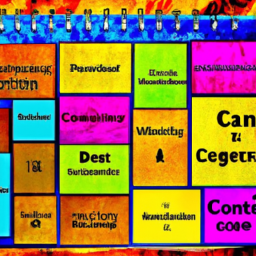How a Content Calendar Can Improve Your Marketing Strategy
Introduction
Creating an effective marketing strategy is no easy feat. It requires careful planning, creativity, and the ability to adapt to ever-changing consumer preferences. One tool that can greatly enhance your marketing strategy is a content calendar. In this article, we will explore how a content calendar can help you stay organized, consistent, and effective in your marketing efforts.
What is a Content Calendar?
Think of a content calendar as a roadmap for your marketing strategy. It is a visual representation of when and where your content will be published. It includes the topics, formats, platforms, and dates for each piece of content you plan to create and distribute.
Benefits of Using a Content Calendar
1. Organization and Planning
A content calendar helps you stay organized by providing a clear overview of your content creation and distribution schedule. It allows you to plan ahead, ensuring that your marketing efforts are aligned with your overall business goals.
With a content calendar, you can efficiently manage your resources and allocate them appropriately. You can identify any gaps in your content strategy and fill them with valuable and relevant content, improving your overall marketing effectiveness.
2. Consistency and Branding
Consistency is key when it comes to building a strong brand presence. A content calendar helps you maintain a consistent content publishing schedule across different platforms and channels. By regularly sharing high-quality content, you establish yourself as an authority in your industry and build trust with your audience.
A content calendar also allows you to keep track of your brand guidelines, ensuring that your content reflects your brand’s voice, tone, and values. This consistency helps reinforce your brand identity and improves brand recognition.
3. Content Variety and Optimization
Having a content calendar enables you to plan for a variety of content formats, such as blog posts, videos, infographics, social media posts, and more. This helps you cater to different audience preferences and maximize engagement on various platforms.
Additionally, a content calendar allows you to optimize your content for search engines. By strategically planning keywords and topics, you can increase your chances of ranking higher in search results and driving organic traffic to your website.
4. Collaboration and Efficiency
A content calendar promotes collaboration and streamlines the content creation process. It provides a centralized platform for your marketing team to coordinate and communicate effectively. Everyone involved can see what content is being created, where it will be published, and when it will be shared.
By having a clear content schedule, you can eliminate last-minute rushes, reduce errors, and ensure that all content is thoroughly reviewed and approved before publication. This increases efficiency and helps maintain high-quality standards.
Conclusion
In today’s fast-paced digital landscape, a content calendar is an essential tool for any successful marketing strategy. It brings organization, consistency, variety, and collaboration to your content creation and distribution efforts. By using a content calendar, you can stay on top of your marketing game, engage your audience, and achieve your business goals. So, why not give it a try and experience the positive impact on your marketing strategy yourself?











